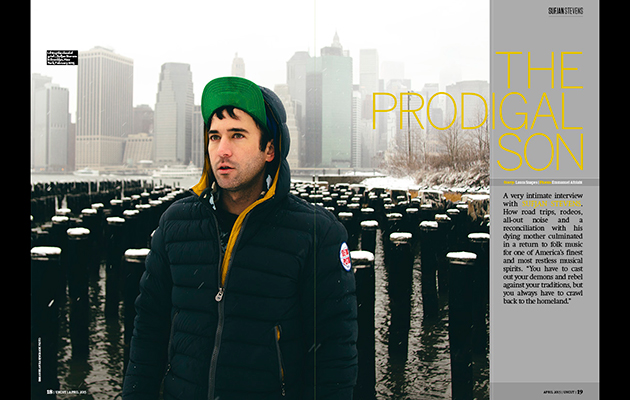Augmented only with piano and occasional gossamer synths, Carrie & Lowell’s folky palette has drawn comparisons to Stevens’ 2004 breakout, Seven Swans. While they share an aesthetic, he admits Swans was written for utilitarian purposes, allowing him to play solo acoustic gigs. In recent years, it felt like a sound confined to his past: around the release of The Age Of Adz, Stevens frequently said that his interests were primarily in all-out noise. “I was sick of my voice and I was sick of the strummy-strum acoustic guitar song,” he told The New York Times.
https://www.youtube.com/watch?v=heZEUHqcnEw
Faltering, he explains why he returned to the ballad form. “I just didn’t feel like I needed to… work through the death of my mother with noise, but with words.” Carrie & Lowell is “the most formal record” he’s ever made, he says, repeatedly saying it contains “no art”.
“I’m not saying these things disparagingly,” he says when accused of self-flagellation, “but as a non-evaluative, objective description. I definitely felt the desire to rewind and return to a more traditional form. You have to cast out your demons and rebel against your traditions and pursue your interests through the adventure of discovery, but you always have to crawl back to the homeland like the prodigal son.”
Lowell Brams kickstarted Stevens’ musical discovery. There was no music, art or TV at home with his dad and stepmother in Detroit, who taught and educated their kids at the Waldorf School where the emphasis was on “the imagination, and eradicating the media accessories from your life in order to cultivate the liveliness of your mind,” he says. “Our house was almost sterilized.” That first summer in Eugene, Brams introduced Stevens and his siblings to The Beatles, the Rolling Stones, Ry Cooder, Bob Dylan, Nick Drake, Frank Zappa. “The Wipers were his favourite band,” says Stevens. “It was as if he had opened up a Pandora’s Box, and we were so thrilled. It was like sensory overload – we would record these radio shows, DJ and do skits.”
Brams is now 63 and lives in Lander, Wyoming. He and Stevens founded Asthmatic Kitty in 1999, though he is slowly stepping back from its day-to-day running. After Carrie and Lowell separated, Brams continued to see Stevens and his siblings, bringing them cassette tapes. On one trip back from the west coast, he visited the family home in Petoskey, Michigan, and heard a 15-year-old Stevens’ first original compositions. “I had heard him playing the piano earlier, but when I stopped by that time he played things on his little Casio – like classical piano concertos or something, but they were his own. That’s when I thought, ‘Wow! That’s really unusual.’”
The pair grew closer when Stevens attended Hope College in Holland, Michigan, where Brams was living in order to take care of his elderly parents. He drove Stevens’ folk-rock band Marzuki to gigs and eventually replaced him on organ duties in garage party band Con Los Dudes when Marzuki briefly moved to New York. When they split and crawled back home, Asthmatic Kitty was born. In 2000, Stevens’ debut album, A Sun Came, became the label’s first release.
Brams won’t pick a favourite of Stevens’ records, but says he cried when he heard the three songs that would open Michigan. He had no qualms about having his name on Stevens’ new record. “I am really impressed about the music he’s done and the way he works, and who am I to question his creative decisions?” he says. “They always seem to be right.”



